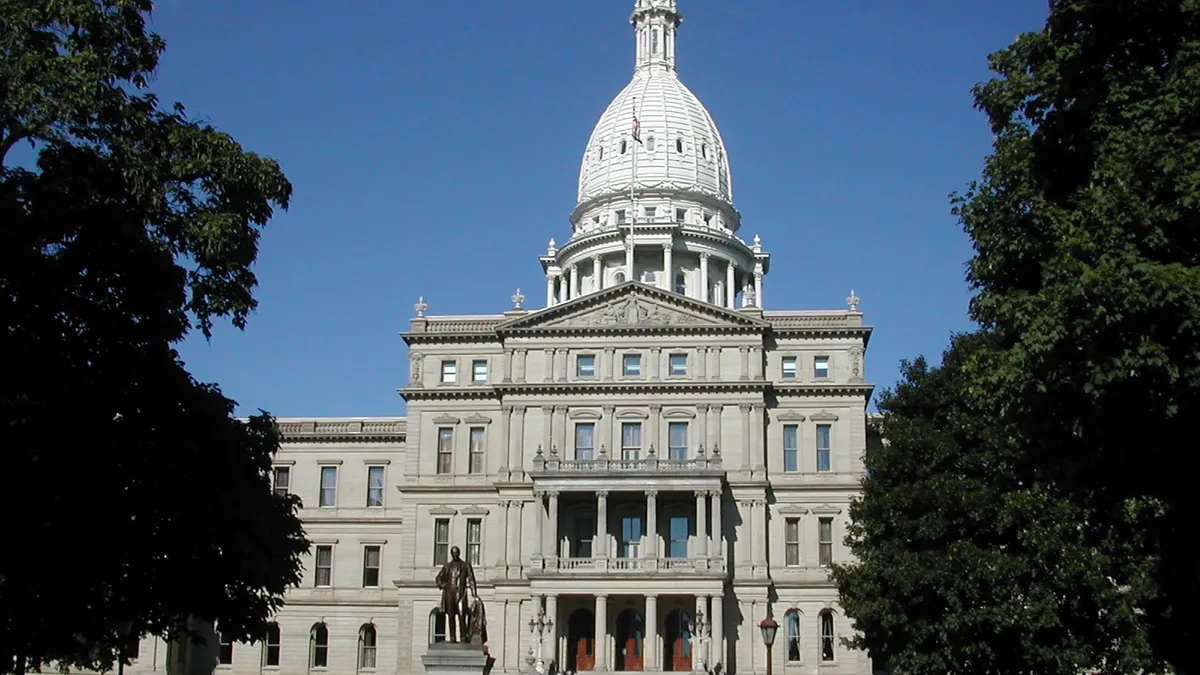Dive Brief:
- The Michigan Senate this week passed a contentious energy bill advocates say could reshape the state's small retail choice market. While supporters say the measure will protect customer reliability, opponents expect it to raise prices.
- SB 437 would put new limits on the retail choice providers that supply 10% of the state's customers, including requiring them to secure supply two years in advance or generate their own electricity. It passed the Senate by a 26 to 10 vote.
- Another approved measure would increase the state's renewable standard from 10%, which the two major utilities have already met, up to 15% by 2021. It passed 26-11.
Dive Insight:
Though both Michigan energy measures passed the Senate on bipartisan votes, the Detroit Free Press reports there's no indication yet of when the House could take up the measure.
Supporters of the retail choice measure say it will ensure reliability in the face of looming generation shortfalls, which regional grid operator MISO has warned could hit as soon as 2018.
With 10% of the state's market served by alternative suppliers, supporters argue utilities will only build for the 90% of the market they serve. The new rules would require retail providers to prove they had supply two years in advance, produce their own power or acquire capacity from utilities.
Energy choice advocates say the will kill the retail market and argue reliability concerns are misplaced. State officials are already developing a plan with MISO to ensure electricity supplies for the state three years in advance to ensure adequate capacity.
Nine GOP senators voted against the bill after the failure of an amendment that would have put limits on capacity charges utilities can charge alternative suppliers for purchased power, according to the Press.
“Senate leadership ignored the pleas to reject the version of SB 437 that passed and to adopt the MacGregor Amendment," said Wayne Kuipers, executive director of Energy Choice Now, an advocacy group. The amendment had support from large companies in Michigan like Kellogg, US Steel, Pfizer and the Michigan Manufacturers Association.
"Nobody is getting 100% of what they want," said Sen. Mike Nofs (R), chair of the Energy and Technology Committee, according to the Free Press. "We have crafted a policy that balances a broad and wide range of interests."
Senate leadership proposed strengthening the renewable standard in October to win Democratic votes and the Michigan Chamber of Commerce endorsed the package, saying it was confident the bill would not eliminate the choice market.
In addition to the 15% mandate, the bill also sets a voluntary goal to obtain 35% of the state's power from reneawbles or efficiency measures by 2030 and encourages time-of-use pricing.
Michigan's major utilities, Consumers and DTE Energy, supported the bill since its introduction. DTE issued a statement saying the vote was a "significant step forward in efforts to secure the long-term reliability of the state's electric system" and urged the House to follow suit.















